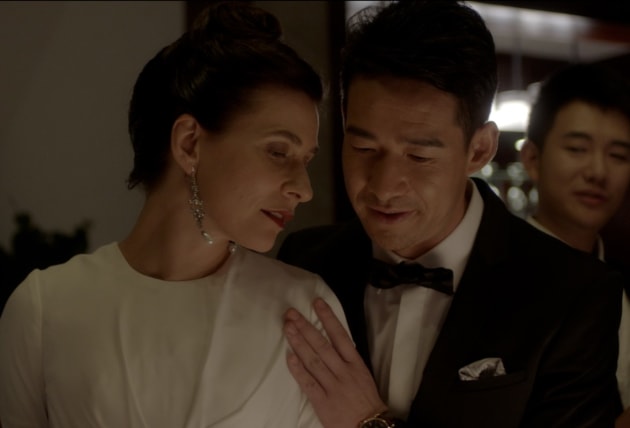Touch is an exotic thriller written, directed, and starring Aleksandra Szczepanowska.
Set and filmed entirely in China, Touch follows Fei Fei, a western woman married to a Chinese man, Zhang Hua (Yang Jun), as they navigate her immigration challenges trying to get permanent residence status in her adopted home of China.
At times erotic, fanciful, and thrilling, but does Szczepanowska pull off the film’s many layers? Let’s take a look.
Despite adopting China as her home, marrying Zhang Hua, and sharing a son with him, gaining permanent residence is an entirely frustrating process.
They’re called on to share their most intimate details, and while Fei Fei’s existence in China hangs in the balance, she discovers Zhang Hua withdrawing his support, sending her into a tailspin.
Initially, it seems the couple has a loving marriage. Fei Fei seems happy taking on a traditional role in the relationship despite her western upbringing, even as Zhang Hua relishes having a beautiful, tango-teaching wife, who is much different than any of his friend’s wives.
The more uncertain Fei Fei feels about her future, the less secure she feels in her marriage. She begins acting strangely, pushing the boundaries of Chinese tradition, embarrassing Zhang Hua in front of his friends.
As the friction between them increases, Fei Fei seeks comfort elsewhere, ultimately discovering a blind masseur with whom she engages in a passionate affair.
Much of this story is predicated on its location and social mores of China. Shot entirely in Beidaihe, China, Szczepanowska was the first western woman to shoot an independent movie in the People’s Republic of China. That’s a significant achievement.
The genesis of the film is that Szczepanowska, born in Poland and raised around the world with significant time spent in China, has always felt like the other. That unsettled feeling that she doesn’t belong has led to exploring unsettled characters who push boundaries.
In Touch, Fei Fei is already an odd woman out as a dance instructor. Touch between strangers isn’t forbidden, but it’s frowned upon. Teaching tango requires close physical contact, and as such, her chosen profession isn’t considered essential, hampering her quest for permanent residency.
So Fei Fei’s decision to visit a blind, male masseur isn’t odd for her, but it’s entirely new for Bai Yu (Yuan Jiangwei), who is as uncomfortable massaging a woman as he is aroused by the new experience.
Fei Fei craves reassurance, but she’s not willing to put her entire future on the line to get it. It makes sense to find someone who cannot see her stretch her wings, but Fei Fei mistakes blindness as a disadvantage, underestimating Bai Yu’s feelings and his ability to connect the world at large.
It’s a grave error that comes back to haunt her as the affair takes on a life of its own.
As Fei Fei discovers more about her husband and begins to trust in their relationship again, she pulls away from Bai Yu, forcing her to realize that underestimating him and toying with his feelings could do the one thing that she was hoping to avoid.
Szczepanowska does a lot right with Touch. Especially in the US, immigration is a hotbed issue. Exploring how it affects someone from the western world offers an opportunity to put yourself into someone else’s more familiar shoes. Touch underscores the stress and trauma of relocating to a country vastly different from your own.
It doesn’t matter where you’re from or where you’re going, or how much you want to be there; that kind of move can throw even the most confident off balance.
Touch explores those issues without pointedly doing so. Pulling the weight of immigration away from the story and setting it on a torrid affair makes it easier to understand the difficulty Fei Fei faces.
She’s in love with her husband, and her son means everything to her, but her insecurity that the country she craves might not accept her leads her down a dangerous path that could ruin all of it.
When it comes to Touch the thriller, things are less certain. When Fei Fei’s affair goes awry, the consequences unfold in a series of apparent fever dreams that confuse reality. By the end of the film, the conclusion was, at best, left open to interpretation.
Bai Yu unexpectedly became everyone’s worst nightmare. As he became suspect, the story’s validity got muddied, and it was impossible not to question everything that came before. A review should never spoil the viewing experience, so that’s as far as this will go.
The film succeeds in its immigration theme and exotic location. Seeing Chinese life in this setting is unique, making Touch well worth the time. If those two aspects are of interest, you should check out Touch, which is currently available to rent or buy on all major video platforms.
Carissa Pavlica is the managing editor and a staff writer and critic for TV Fanatic. She’s a member of the Critic’s Choice Association, enjoys mentoring writers, conversing with cats, and passionately discussing the nuances of television and film with anyone who will listen. Follow her on Twitter and email her here at TV Fanatic.





